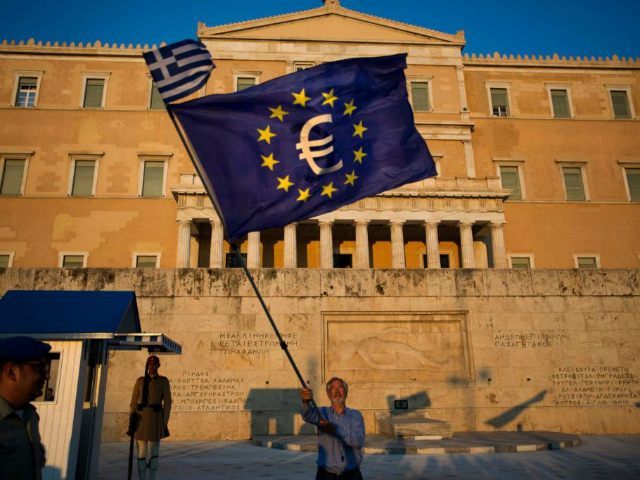There has been trouble brewing between the International Monetary Fund and the European Union about the vast debts Greece owes to both of them, but rhetorical shots were finally fired on Wednesday, as the IMF offered stiff criticism of the EU’s bailout deal with Greece.
At issue is the IMF’s contention that Greece needs massive debt relief—which the IMF envisions as basically extending their repayment terms for decades—”well beyond what has been under consideration to date,” as the BBC reports.
It is the first time the IMF has offered such resistance to the EU’s Greek agenda in public. EU officials were aware of the not-yet-publicized IMF report when they held meetings on Sunday to consider Greek proposals, but they chose to disregard the IMF’s recommendations.
The New York Times clarifies that IMF wants creditor nations to “let Athens write off part of its huge eurozone debt or at least make no payments for 30 years.”
The IMF makes an argument basically similar to the rationale for extending a long-overdue mortgage with long-term refinancing at low, low interest rates: it is better to give the creditor a long time to repay the debt, and hopefully get back on his feet, than to demand quicker repayment with harsher terms.
However, the BBC notes that taxpayers in the Eurozone’s creditor nations are growing weary of financing bailouts, mentioning one proposal to use the European Financial Stability Mechanism fund, “which would mean UK taxpayers contributing further to financial support for Greece.”
The IMF also fears too much is expected of the Greek economy in the near future, making it reluctant to contribute more money for bailout loans it fears will never be repaid. “Its analysis, released on Tuesday night, pointed to Greek government debt reaching a peak of close to 200% of GDP or national income – over the next two years, which it called ‘highly unsustainable,'” writes the BBC.
It is hard to argue with that assessment, although the strategy of dealing with unsustainable debt by not collecting it can be a tough sell to frustrated creditors. The New York Times offers a spine-tingling example of how bad the situation has grown: the IMF estimated Greece needed 50 billion euros in immediate financial aid in a report on July 2, but by July 10, they had already upped the estimate to 85 billion euros.
Robert Preston, the BBC’s economics editor, suggests the IMF’s analysis will stiffen Greek parliamentary resistance to the bailout deal Prime Minister Alexis Tsipras reached with the EU, “against his strong preference.” In fact, Tsipras has been basically presenting himself to the Greek public as a debt hostage with a fiscal gun to his head, which is a far cry from the blustery big-spending socialist who swept into office promising to bring Greece’s creditors to their knees, and tell them to stuff their Eurozone if they didn’t meet his demands.
“To be tediously literal, the IMF has made it clear that it does not wish to participate in any further Greek bailout, unless Germany and the rest drop their vehement opposition to big write-offs of Greek debt,” Preston writes. In other words, everybody else gets a haircut while the IMF watches from outside the barber shop. It’s understandable, especially since the IMF is expected to plow more money into a rescue plan it has grave doubts about, but it is also understandable that the rest of Greece’s creditors don’t want to hear it.
BBC also mentions that resistance to the EU bailout plan in Greece has produced strikes by “unions and trade associations representing those including civil servants, municipal workers and pharmacy owners,” which is maybe not the best strategy for a country with a shaky economy and banks that won’t reopen for at least another month.

COMMENTS
Please let us know if you're having issues with commenting.